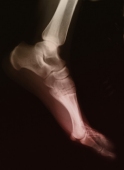People over 30 may take more time to safely adjust to ‘minimalist’ shoes
TUESDAY, March 24, 2015 (HealthDay News) — A new study suggests that runners over the age of 30 who transition from traditional running shoes to minimalist shoes should do so cautiously to avoid injury. The findings are scheduled to be presented this week at the annual meeting of the American Academy of Orthopaedic Surgeons, held from March 24 to 28 in Las Vegas.
Scott Mullen, M.D., a researcher at the University of Kansas Hospital Sports Medicine and Performance Center in Kansas City, and colleagues tested 26 runners — all over 30 with at least 10 years of running experience — and found they were not as adept at transitioning to the new forefoot strike pattern favored by the minimalist shoe. Mullen’s team tested the older runners on the treadmill at various speeds, both in their conventional running shoes and barefoot. “They ran barefoot because the minimalist shoes are an attempt to mimic barefoot running in a more protected fashion,” Mullen told HealthDay. Runners were tested at running speeds of 6, 7 and 8 mph for women and 7, 8 and 9 mph for men. As they ran, a camera captured their feet’s strike pattern.
Previous studies have shown that, “in adolescents, the amount of heel strike decreased with increasing speed,” Mullen said. Not so in adults. “There was persistence of the heel strike in the adults, regardless of speed,” he found. In fact, “43 percent of the adults continued to heel strike barefoot at the highest speed, compared to about 12 percent of the adolescents.” That means that older runners who want to transition to the lighter shoes may need more time for their feet to adjust.
With a minimalist shoe, landing on the forefoot allows the foot to naturally dissipate the forces of the foot strike better, Mullen explained. But when people don’t change their foot strike from the heel to the forefoot, this can boost their risk of injuries such as stress fractures, he said. Some of these injuries may only mean a little time taken off from running, but others could be so serious that they require surgery.
Copyright © 2015 HealthDay. All rights reserved.








